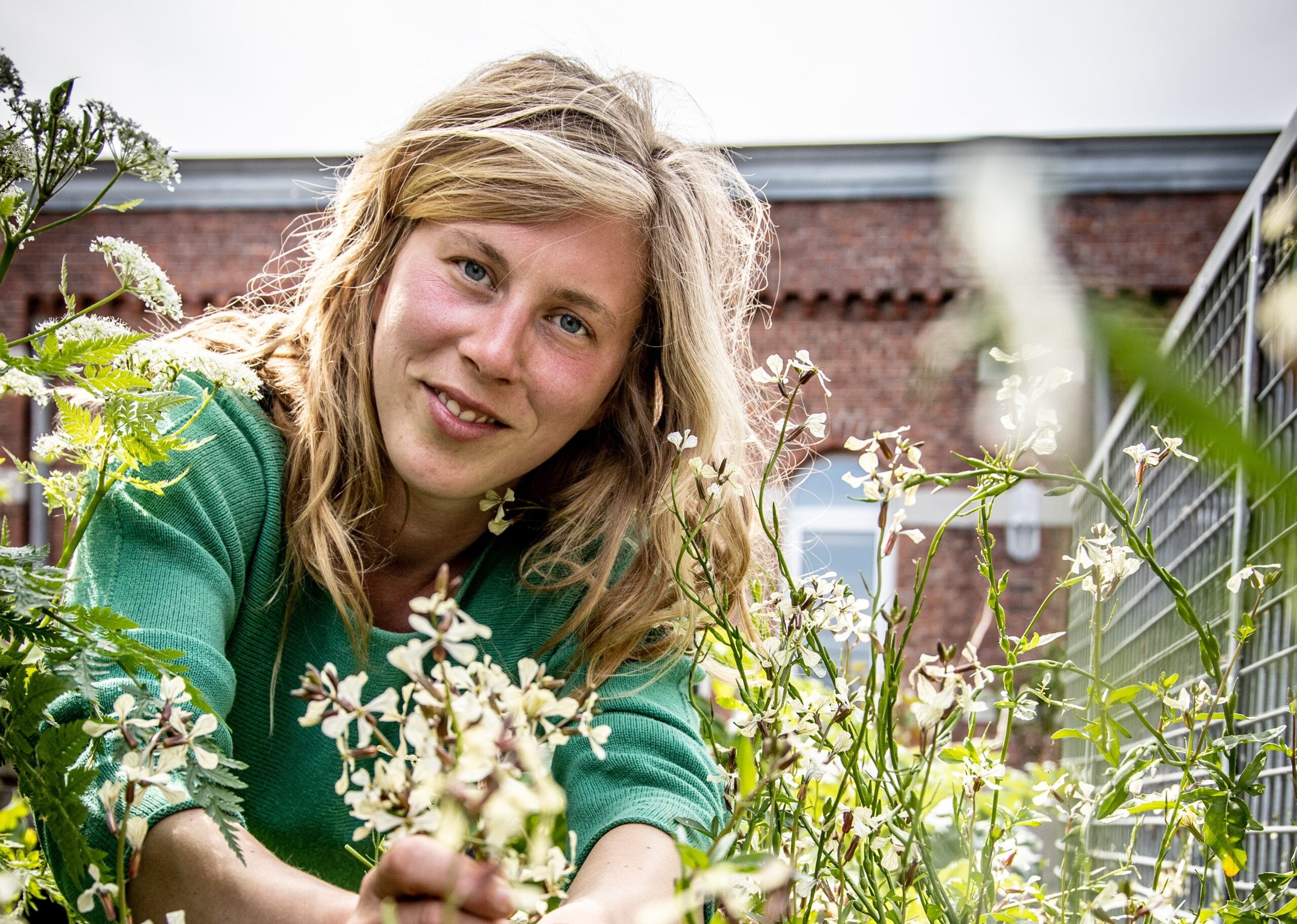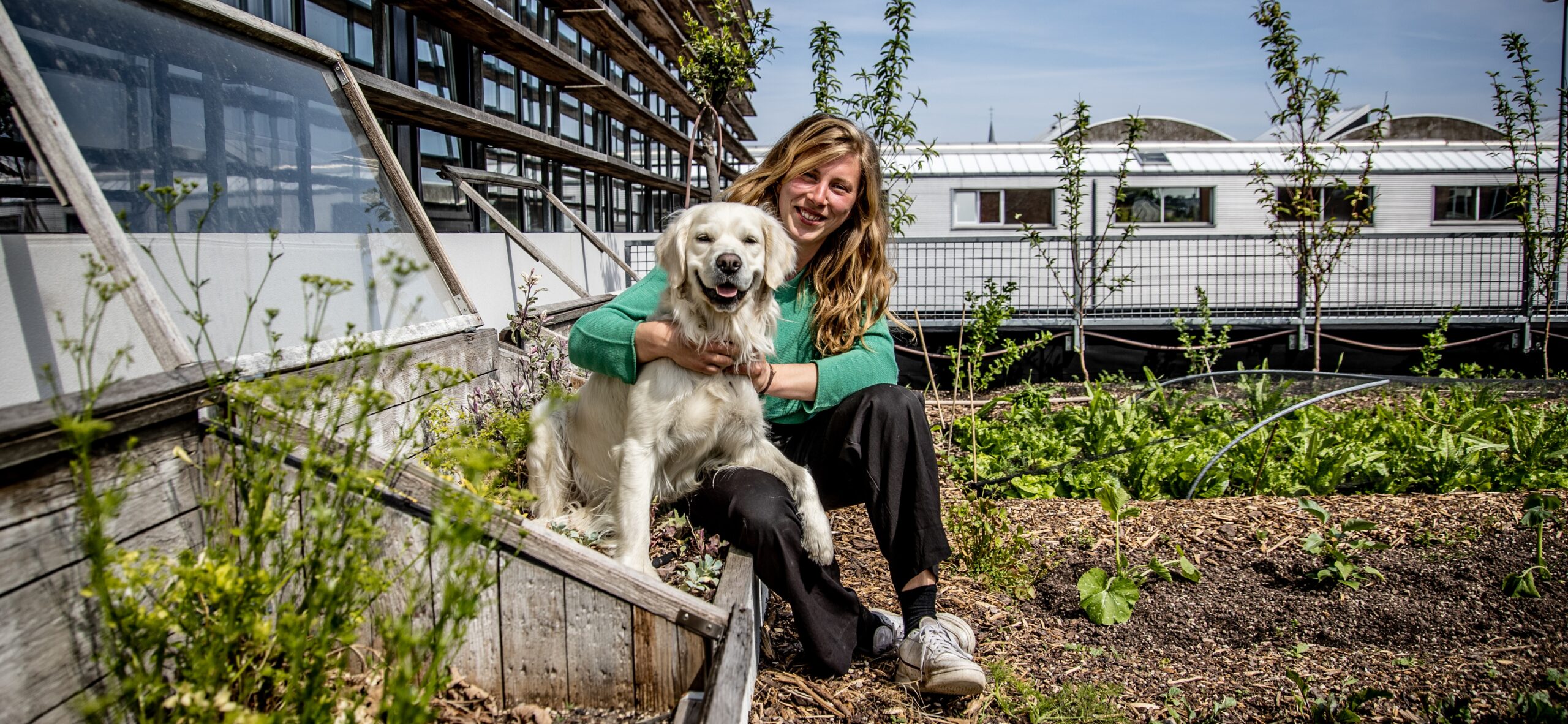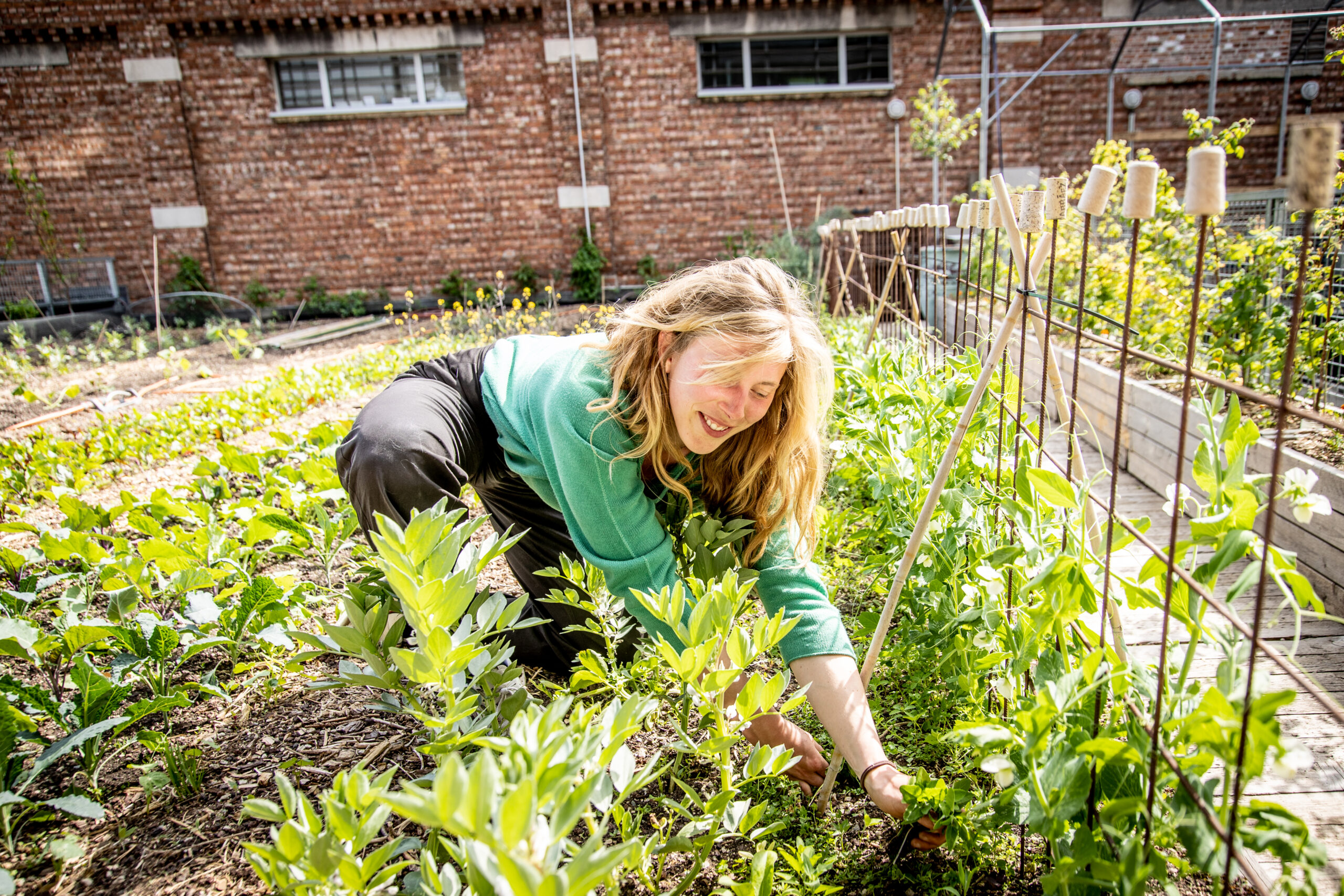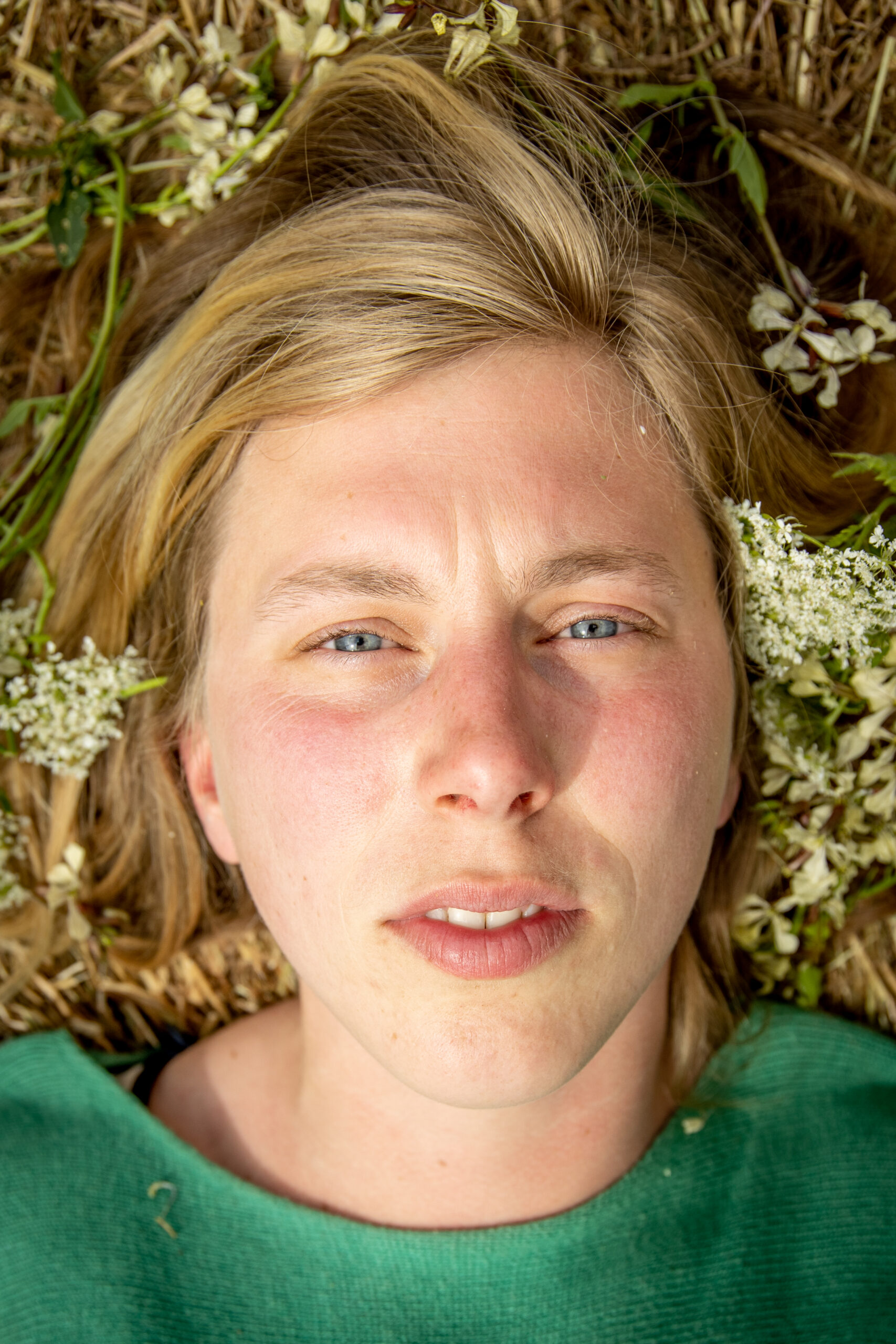Roof Food, from roof to plate…
Sabien Windels, a rooftop farmer, feels reborn five years after the start of Roof Food. “My mission is clear, which is to inspire and convince people about sustainable food, buying locally and the value of being close to nature.” The Corona pandemic helped Sabien to regain her focus and her new project became a roof vegetable garden shop.
 Sabien Windels (of Roof Food) finds a second wind.
Sabien Windels (of Roof Food) finds a second wind.
“After five years, I’m back on track with a new concept”
Sabien Windels (31) has been pioneering the first roof vegetable garden in Belgium for five years, with the creation of Roof Food. Using various creative concepts, she promotes urban agriculture, value-driven entrepreneurship and vegetable gardening from the roof of the De Punt business centre in Ghent. Urban agriculture, value-driven entrepreneurship and vegetable gardening were not an obvious course for a career change and, after many setbacks, successes and a corona crisis later, she is now back on track with a brand new vegetable garden shop.
“I feel like I’ve been reborn today,” says Sabien. “I feel the same as I did five years ago at the start of Roof Food. I’m energetic, enthusiastic, full of self-confidence again, and am convinced that our new concept, the vegetable garden store, will be successful. It is clear that Sabien, the founder and manager of Roof Food, is looking forward to it. However, the past few years have not all been sunshine and roses. On the contrary, she describes it as “a fantastic adventure and an agonising experience at the same time.”
“The past few years have been both a fantastic adventure and agony at the same time.”
“I could hide it well, but for the past five years, I’ve often felt bad. The struggle to combine my passion for urban agriculture with a profitable organisation has caused a lot of stress. I could feel it both mentally and physically. That really wasn’t okay because that’s exactly what I didn’t want to achieve with Roof Food. I want to connect people back to nature and so back to themselves.”
Interest in ecology and sustainability
Although she was studying commercial engineering at UGent, Sabien was already interested in ecology and sustainability. After that, she could only partly express this interest in a research project at KaHo Sint-Lieven on sustainable cities. “I discovered myself during those two years. It felt good to be surrounded by people with the same values, who asked themselves the same questions that I had asked myself. We thought about the city of the future, about renewable energy, carbon dioxide reduction and climate plans for cities.”
Sabien became fascinated by ecological, sustainable food, the short chain principle and the local economy, and is becoming increasingly more absorbed by it all. “The idea of roof vegetable gardens first came to me during a meeting of the Ghent Think Tank on urban agriculture about the difficulties facing farmers in finding available land. I felt that a trend was on the way as I saw how people had become alienated from food and nature and that there was a need to return. People needed to be closer to nature again.”
Fanatical vegetable gardening
In the meantime, Sabien has become a fanatic at vegetable gardening in her spare time. She devours vegetable gardening bibles, takes workshops and concentrates on composting. Together with her father, who is also an engineer, she is building a greenhouse and plans to do aquaponics. This is an approach within urban agriculture that works without soil and only uses very light substrates or nets. “I can still see us driving on the Brussels Ring road, with our trailer loaded with five-metre-long tubes for our pilot installation.” Sabien laughs, “We were two geeks together.
That was great, although the longer I was working on it, the more I realised that that wasn’t what I believed in. That wasn’t the message I wanted to convey. I wanted to bring people back in touch with nature and the seasons. I wanted to show them how good nature is and how inspiring it can be if we leave it untouched. For me, such a controlled system of aqua- and hydroponics was at odds with that.”
Sustainable economy
After that realisation, the step to roof vegetable gardening was quickly made. Sabien delves into all aspects of green roofs and is inspired by urban designers who advocate sustainable cities and has realised that she wants to become a roof farmer. “At one point, it was so clear to me that I could no longer ignore that feeling.” Sabien wants to get it right. She wants to distance herself from similar existing hippie initiatives and sees it as more of a commercial enterprise. She is not interested in the believers; it is the sceptics she wants to convince that roof gardening is a new form of a sustainable economy.
Puzzle
In January 2014, when Sabien was only 24 years old, she started her business plan. To set herself a deadline, she participated in Bizidee, a competition for starting entrepreneurs. Her dream quickly turned into a concrete idea.
“Trends such as the greening of cities, the revival of old crafts and the short chain principle, I joined them together into something concrete.”
“The concept of a roof vegetable garden is not earth-shattering; the time was just ripe for it. I saw the greening of cities, the revival of old crafts and the short chain principle. I merged all those trends and turned them into something concrete. I see it as a big puzzle whose pieces I’ve put together.”
She spoke with architects and stability engineers from the city of Ghent, and started looking for a suitable roof in Ghent. This brought her to the De Punt business centre in Gentbrugge, which had plans to start up a new building project. “From the first contact with Dany Neudt, the director at the time, I knew that I had found the right location. It clicked right away between us and there was an immediate mutual trust. I still can’t think of a better place for a roof vegetable garden than here.”
Ten months after the launch of her idea in October 2014, the CVBA Roof Food was officially established. The roof of De Punt was delivered two years later. “Of course I didn’t want to wait that long. The idea was born, and I had come up with the name “Roof Food”, launched the website, and I had already made a lot of buzz with my participation in Bizidee. I wanted to get to work.”
“Even before Deliveroo and co, we delivered vegetarian lunches from our roof vegetable garden; we called it “the roof dish”.
Sabien placed the advertisement, ‘Roof Food seeks roof’ in the newspaper and immediately received a positive response from Gaston, a restaurant on the roof of an old textile factory. The first Roof Food roof vegetable garden with an area of fifty square metres became a fact in 2015. Thanks to a subsidy from the Agency for Innovation and Entrepreneurship (VLAIO), Sabien was able to experiment and find the most suitable substrate for different groups of plants. It also meant the start of Roof Food’s first creative concept: the roof dish.

“The idea was to offer the companies in the neighbourhood a sustainable lunch consisting of three vegetarian preparations served in preserving jars. The lunches would then be delivered by cargo bike. That was long before there was anything around like Deliveroo,” smiles Sabien. A cook was needed to bring those roof dishes to reality. Sabien wrote out a job advertisement for a cook/company manager and from then on Roof Food, with Nine on board, had two employees.
The move to the roof of De Punt followed at the beginning of 2016. “That’s when we went deep into the red in terms of workload. We had to arrange the move, create a roof garden of five hundred square metres, design the kitchen and have it fitted out. That was actually a bit too intense, but we had no other choice.”
Catering and roof dinners
Sabien and Nine didn’t get a lot of time to recover because unexpectedly they received many more catering requests from governments and companies. “Of course, that was something different from those roof dishes. Catering that is going on location, serving drinks, going around with snacks. In fact, it was pure catering.” In order to meet this growing demand, Roof Food hired a second chef, Aram.
At first, the roof dishes and the catering ran together simultaneously, but it soon became clear that the roof dishes were not profitable. “That was too good a product for too little money,” Sabien admitted. “Inventive vegetarian cooking is labour-intensive anyway. Add to that the competition from Deliveroo and the majority of people who didn’t want to spend more than twelve euros for lunch, so that was that.”
 “Commercially, catering was a much more interesting track. Aram was an excellent cook who took the quality of our offer to a higher level. In 2016, we also started with roof dinners. During the summer months, people could dine on our roof and taste our home-grown crops. We bought the products that we could not supply ourselves from local organic farmers.
“Commercially, catering was a much more interesting track. Aram was an excellent cook who took the quality of our offer to a higher level. In 2016, we also started with roof dinners. During the summer months, people could dine on our roof and taste our home-grown crops. We bought the products that we could not supply ourselves from local organic farmers.
The guests were also given a tour of the garden and were given an explanation about our vision and operation. It was more than just dining in the end, it was an experience in itself, including a gastronomic five-course menu at a democratic price in the middle of a vegetable garden in full bloom. Those were fantastic evenings!”
Hard times
A difficult period began for Sabien, personally, and for Roof Food in general from 2017. There was a lot of tension between colleagues, and communication was difficult. “We didn’t argue,” explained Sabien. “We were just on a different wavelength. I had no experience at all with the hospitality industry and it soon turned out that I didn’t like it. I was very focused on Roof Food’s mission to inspire and convince people of sustainable food, to buy locally and to be close to nature. Aram and Nine, on the other hand, wanted to focus mostly on catering and expanding the hospitality side.”
Meditation as salvation
“Meditation helps me to perceive things more objectively”
 Three tough years followed for Sabien with a lot of self-doubt and two burn-outs. “In 2018, I crashed twice and was out for six months while my colleagues kept things running. I just wasn’t able to work anymore.” During this period, Sabien met a coach who specialised in intuitive entrepreneurship and who offered to guide her. She took up his offer and one year later she also became acquainted with transcendental meditation, a technique in which you reach a deeper state of consciousness and can think holistically. “That has changed a lot for me!
Three tough years followed for Sabien with a lot of self-doubt and two burn-outs. “In 2018, I crashed twice and was out for six months while my colleagues kept things running. I just wasn’t able to work anymore.” During this period, Sabien met a coach who specialised in intuitive entrepreneurship and who offered to guide her. She took up his offer and one year later she also became acquainted with transcendental meditation, a technique in which you reach a deeper state of consciousness and can think holistically. “That has changed a lot for me!
Thanks to that meditation – which, by the way, I still do twice a day today – I was able to see things as an objective observer. I became softer and I understood Aram’s and Nine’s points of view more. It wasn’t my ego talking anymore and that was quite a relief. Afterwards, I embraced the whole catering business and worked very hard for the roof dinners and catering to show my team that they could count on me. I enjoyed it and they appreciated it.”
Happonomy
In the autumn of 2019, Sabien met Happonomy, the organisation that wants to improve people’s quality of life and offers solutions to tap into human resources, money and technology to make progress. “Together with Happonomy, we took a close look at Roof Food as an organisation. The timing could not have been better because, in that period, we suffered one setback after another; Nine suffered from burnout, the roof was leaking and we were in a difficult situation. At that moment, I couldn’t see a way out.
Luckily, the people from Happonmy had a very clear view and they helped us step by step. Without them, the damage to Roof Food would definitely have been bigger. After the financial analysis, I finally decided to stop the catering. It wasn’t profitable enough and it wasn’t my passion anyway. What’s more, at the time I was already playing with the idea of starting consultancy in roof vegetable gardens. I regained confidence that there were other revenue models and I started to realise more and more that I no longer wanted to work with so many permanent staff.”
Crisis brings solution
When the corona crisis broke out, I stated, “It’s my birthday on March 13th, lockdown day. In spite of the terrible crisis happening around the world, I felt that, for me personally, it was the most beautiful gift ever.
Suddenly, the whole world was on a break. My phone stopped ringing, appointments and catering assignments were cancelled, I received financial support, but most of all, I suddenly got a lot of space and time to think about the future. That was just what I needed after the difficult decision to stop the catering.”
“The fact that the world was on a break because of the lockdown was exactly what I needed. Suddenly I got space and time to think about the future”
Sabien didn’t have to think that long about it. Corona led her naturally to a new, temporary concept: a vegetable garden shop on the roof. “It is a logical step in these uncertain times in which people tend to retreat. More than ever, people are opting for safety, they want to buy locally and be self-sufficient, and vegetable gardening fits in perfectly with that.”
Together with Jonathan, the roof farmer who has been working for Roof Food for a year, Sabien is going to run the roof shop. “I like being able to do this together with Jonathan. We share the same vision and strengthen each other a lot. Jonathan is a real craftsman. He grows plants slowly with a lot of love and patience. We will sell them in the first phase.”
“Today, I feel like I’m reborn, and am ready to give 100% to the vegetable garden shop.”
“As I just said, today I feel like I’ve been reborn. I’ve been able to finalise everything well with Aram and Nine, it looks like I’ve found a buyer for the kitchen and I’m ready to give 100 percent to the vegetable garden shop. Although it’s a new start, it’s one with a lot of knowledge and experience going into it. The brand is there, the customers are there and I’m sure this is going to catch on.”


Leave a reply